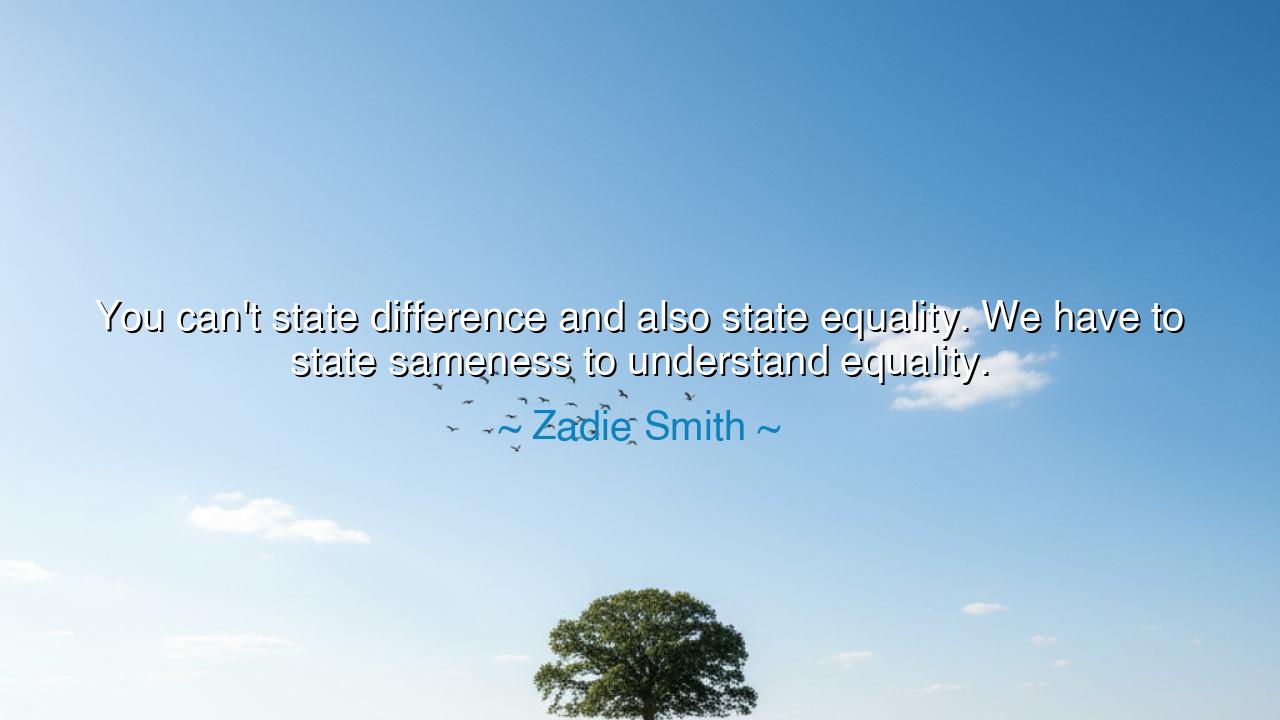
You can't state difference and also state equality. We have to
You can't state difference and also state equality. We have to state sameness to understand equality.






The novelist and thinker Zadie Smith, whose voice carries both the weight of philosophy and the rhythm of poetry, once said: “You can’t state difference and also state equality. We have to state sameness to understand equality.” These words, luminous and sharp, confront one of the oldest dilemmas of human society. We are many, varied in color, faith, gender, and culture; yet when we cry for equality, we must look past difference and proclaim that beneath all variations, we are the same. For equality rests not upon what divides us, but upon the recognition of our shared humanity.
To state difference is to acknowledge the uniqueness of individuals and groups, but if we build our foundation of justice upon difference alone, we risk creating hierarchies—“this group deserves more, that group deserves less.” History has shown us again and again how difference, when exalted, becomes the seed of oppression. Kings proclaimed themselves different from subjects, masters from slaves, men from women, the wealthy from the poor. And from these claims of difference sprang inequality and bondage. Thus Smith reminds us: to defend equality, we must first state sameness—the truth that all are human, all are deserving of dignity, all are heirs of the same light of life.
Consider the words of Thomas Jefferson in the American Declaration of Independence: “All men are created equal.” It was a bold claim of sameness, a declaration that the differences of wealth, title, or birth were illusions in the eyes of justice. Yet even then, the practice betrayed the principle—slavery endured, women were silenced, Native peoples were dispossessed. The lesson is clear: when sameness is proclaimed but not lived, equality falters. Only when sameness is held firmly in the heart and extended to all, without exception, can equality flourish.
History offers another striking example in the civil rights struggle of the twentieth century. Martin Luther King Jr. stood on the steps of the Lincoln Memorial and declared his dream that people would be judged not by the color of their skin but by the content of their character. Here again is the wisdom of Zadie Smith: the claim to equality rests upon the proclamation of sameness. Though skin may differ, though history may divide, the core of humanity is shared. To forget this is to fall into division; to remember it is to call forth justice.
Yet we must be cautious. Smith does not deny that difference exists, nor does she diminish its beauty. Cultures, identities, and traditions enrich the human story. But when we speak of rights, of justice, of equality, we must begin from sameness. Only then can difference be celebrated without turning into chains. Equality is not the denial of diversity, but the recognition that diversity blossoms from the soil of shared humanity.
The deeper meaning is this: every movement for justice begins by reminding the world of what is common. Women had to declare themselves equal in humanity to men before their specific rights could be won. Workers had to proclaim their sameness with the wealthy before demanding fair wages. Colonized peoples had to assert their human sameness with empires before demanding freedom. Without sameness, demands for equality collapse, for difference alone gives the oppressor grounds to deny.
The lesson for us is clear: if we wish to advance equality in our homes, our communities, our nations, we must first proclaim sameness. Do not let difference be weaponized to divide. See first the shared light in every human being—the capacity to love, to suffer, to dream. Then, once equality is secured, celebrate difference as a gift, not as a justification for inequality.
Practical wisdom flows from this: when you speak of justice, anchor it in the truth of sameness. Teach children that though appearances differ, their worth is equal. Support movements that begin from universal rights, not exclusive claims. And in your own heart, practice seeing the stranger as yourself. For when sameness is honored, equality becomes unshakable, and difference becomes a song, not a weapon.
Thus, let the words of Zadie Smith endure: equality is born not from difference, but from sameness. And only when we remember that we are one family, one humanity, can the dream of justice become reality.






AAdministratorAdministrator
Welcome, honored guests. Please leave a comment, we will respond soon